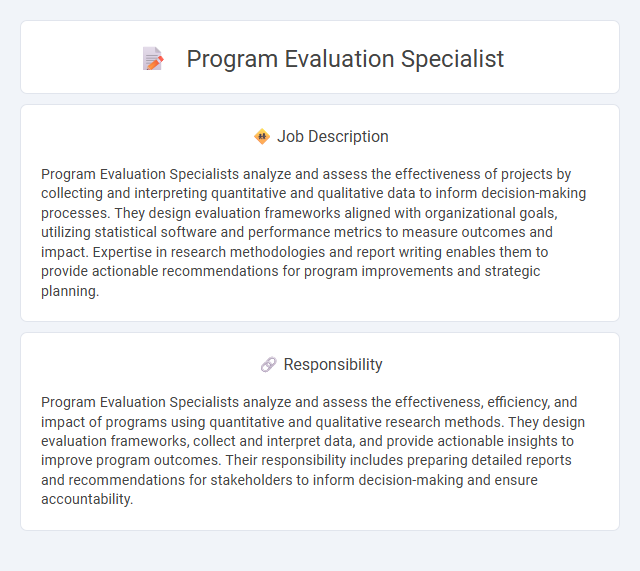
Program Evaluation Specialists analyze and assess the effectiveness of projects by collecting and interpreting quantitative and qualitative data to inform decision-making processes. They design evaluation frameworks aligned with organizational goals, utilizing statistical software and performance metrics to measure outcomes and impact. Expertise in research methodologies and report writing enables them to provide actionable recommendations for program improvements and strategic planning.
Individuals with strong analytical skills and attention to detail are likely to be well-suited for a Program Evaluation Specialist role. Candidates who are comfortable working with data, conducting research, and assessing program effectiveness probably have a higher chance of success in this position. Those who prefer dynamic environments and can communicate findings effectively may find the job particularly suitable for their strengths.
Qualification
A Program Evaluation Specialist requires strong analytical skills, proficiency in quantitative and qualitative research methods, and expertise in data collection and statistical software such as SPSS or SAS. Candidates must demonstrate experience in designing evaluation frameworks, measuring program outcomes, and preparing detailed reports to guide decision-making. Advanced degrees in social sciences, public administration, or related fields are often preferred, alongside excellent communication and project management abilities.
Responsibility
Program Evaluation Specialists analyze and assess the effectiveness, efficiency, and impact of programs using quantitative and qualitative research methods. They design evaluation frameworks, collect and interpret data, and provide actionable insights to improve program outcomes. Their responsibility includes preparing detailed reports and recommendations for stakeholders to inform decision-making and ensure accountability.
Benefit
Program Evaluation Specialists likely increase organizational effectiveness by identifying strengths and weaknesses in current initiatives. Their assessments probably lead to improved resource allocation and enhanced decision-making. These benefits may result in higher program success rates and better stakeholder satisfaction.
Challenge
The role of a Program Evaluation Specialist likely involves navigating complex data sets and ambiguous outcome measures, which may challenge the ability to provide clear, actionable insights. There is a probability that balancing stakeholder expectations with objective analysis creates tension, requiring advanced communication and negotiation skills. Handling evolving program goals and constraints could add uncertainty, demanding adaptability and continuous learning.
Career Advancement
Program Evaluation Specialists play a critical role in assessing the effectiveness and impact of projects and initiatives, using data analysis and research methodologies to inform decision-making and improve outcomes. Mastery of advanced statistical software, evaluation frameworks, and stakeholder communication enhances career progression opportunities from junior analyst roles to senior evaluator and program management positions. Continuous professional development through certifications in data analytics, public policy, or project management significantly accelerates career advancement in this field.
 kuljobs.com
kuljobs.com